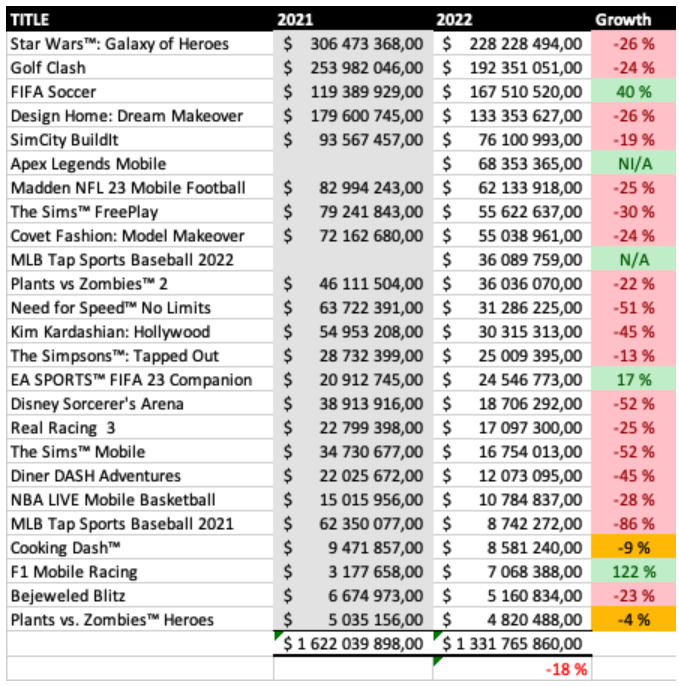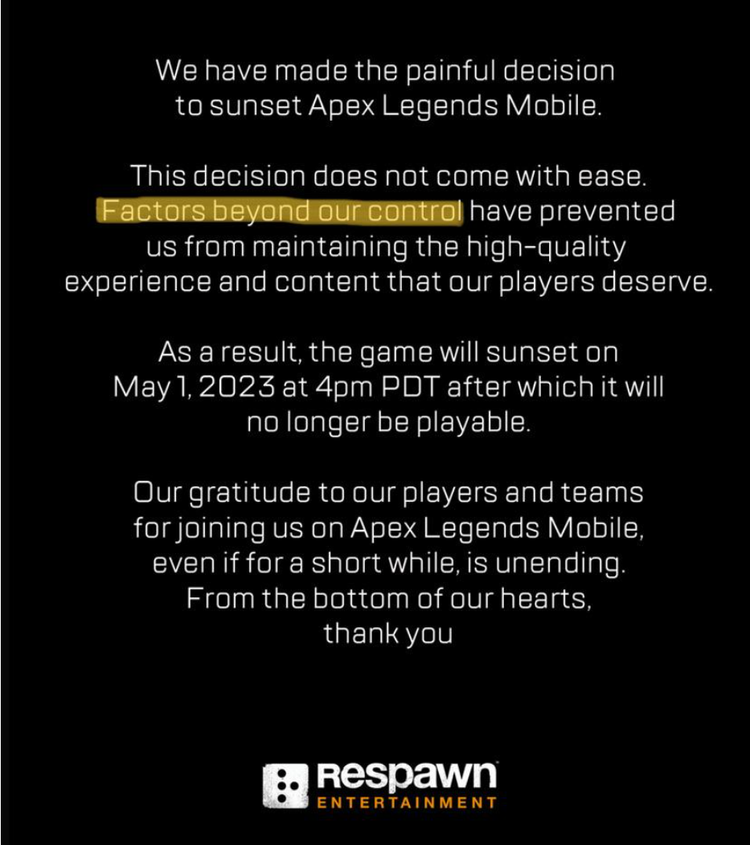🎮 What REALLY Happened with Apex Legends Mobile
In Today’s Email
Turkey has been hit by devastating earthquakes. Thousands are dead. Tens of thousands are in dire need. Here’s the donation link for the biggest search and rescue team in Turkey. Join us in helping and remember that even $1 would make a big difference. https://akut.org.tr/bagis-yap
🚀 EA announced that it was canceling Apex Legends Mobile and Battlefield Mobile. We analyze the real reasons behind all that was publicly said.
🎉 SAVE THE DATE! The Deconstructor of Fun x Google Istanbul conference is coming up on March 9th, 2023! You’ll be notified about signups this week!
On the go? Listen to one of our podcasts from this week, we’ve got:
🎧 TWiG 218 - Everdale's Metacore Move / Death of E3 / EA Abandons Mobile Shooters
What (Really) Happened with Apex Legends Mobile
Last week EA cut the cord on its mobile shooter ambitions with the cancellation of Apex Legends Mobile. It also canned Battlefield Mobile and closed its developer Industrial Toys—a studio it acquired in 2018 but hasn’t released any titles since.
The publisher stated that the ongoing experience of Apex Legends Mobile—developed in partnership with Tencent and Lightspeed—“was not going to meet the expectations of our players” despite a “strong start”. During an investors call, EA CEO Andrew Wilson went further and told investors that the gameplay “didn’t translate quite as well to mobile devices as we had hoped”. He also blamed a “challenging” and “softer mobile market”.
Despite all this, Apex Legends Mobile was on a $100m+ annual run rate and was the publisher’s No. 6 revenue-generating mobile title in 2022 after only 7 months since launch. Meanwhile, despite assertions that it had fallen short on quality, it has garnered a 4.8 Star Rating on iOS and was elected Game of the Year on both the App Store and Google Play.
Even if the game wasn’t hitting the financial and franchise expectations, EA Mobile has no leeway to be picky. Apex was one of the largest games in the company’s steeply declining mobile portfolio.
The acquisitions of Glu ($2.4b) and Golf Clash studio Playdemic ($1.4b) have clearly not gone according to plan. The franchises of both companies have had a steep fall along with the quick exodus of leaders.
Sources from inside EA Mobile also talk about constant restructuring and reorganization, which are likely reactions to stop the slide that started well before the app tracking transparency recession.
read: EA’s acquisition of Glu does not seem to be going according to plan.
After only 7 months of being live, Apex was one of the largest games in EA Mobile’s troubled portfolio. The company was in no position to cancel it based on this. And to be objective, EA Mobile is far from the only one seeing a decline in Mobile.
Numbers showing only estimated net revenue. The year-over-year comparison is what really matters. (source: Data.ai).
What (we believe) really happened
Reason 1: Players don’t abandon games they have been playing for years
Garena Free Fire and Knives Out launched in 2017. The former took the low-end device market while the latter took the Japanese market.
A few months later, in 2018, PUBG Mobile was rushed out, even launching without any monetization. But Tencent knew that to seize the mobile market, they needed to get the game out quickly to stop the momentum of Garena and NetEase and to beat Epic’s Fortnite, which launched later in 2018 on mobile.
The last one to the party was Call of Duty Mobile in 2019. The biggest gaming franchise in the world showed its power with 110m downloads during its launch month.
After that, the market was pretty much saturated with Battle Royale games. So much so that Krafton’s PUBG: New State, which launched in 2021, raked up 50m downloads and then quickly evaporated to obscurity.
Understanding genre saturation in free-to-play is essential. Because even if you release an objectively better game, it will not prevail against titles that have built a strong audience base. For sure people will try the game with a cool IP and better production values, but players will inevitably return back to what they were playing before because all of their community and progress from years prior are there.
Apex Legends Mobile should have been launched before Call of Duty Mobile in 2019 to become the biggest, or second biggest, Battle Royale game on the platform. At the very least it should have launched in 2020 when Fortnite Mobile was kicked out of the app stores.
Despite this, it actually speaks to the quality of Apex Legends Mobile as it was the only successful game to launch in the highly saturated genre.
Reason 2: EA + Tencent = Unrealistic Expectations
Apex Legends Mobile is a phenomenal game with extremely high production values. Given that it was developed in China by the renowned Lightspeed and Quantum (makers of PUBG Mobile), we expect the development team size to be at least 200 strong. Most likely between 300 and 500 people(!).
Why do the size and the pedigree of the development team matter? It is a testament to the size of the investment. And if the investment is top of the class then the expected ROI must be as well.
We don’t believe this was a simple licensed deal with minimum guarantee but rather a revenue share model based on the size of the team working on the game at Respawn. A team that has since then been laid off (please find a list of all the amazing and super talented Apex individuals here).
So did Apex Mobile fall behind expectations? For sure. We believe that both EA and Tencent expected the game to rival Call of Duty Mobile’s revenues. Anything less would likely be a failure as it wouldn’t be enough to make a difference on the bottom lines of the two behemoths splitting the loot.
Reason 3: China + US = Poor Working Relationship
The Deconstructor of Fun’s community is over 1,400 senior games professionals from around the world. And according to multiple sources in this community, co-development between Chinese and American developers and publishers has proven over the years to be extremely difficult.
There are communication challenges due to cultural differences and time zones. The ways of working are different. And as of late, China’s ruthless lockdowns prevented teams from having face-to-face time with each other to build relationships.
Multiple sources from both sides state a lack of respect and humility. The renowned Western AAA studios believe in their superiority in designing core gameplay and delivering outstanding UX. Their Chinese counterparts are masters of free-to-play. They believe their core game is good enough and thus they focus on the metagame, long-term player progression, and monetization.
Relationship issues are not strictly an issue between EA and Tencent. We see relationship issues between NetEase and Activision in the form of canceled publishing deals and canceled games. The fact that Activision is building the next mobile Call of Duty without their Chinese partner is likely partly due to the issues above.
Reason 4: “Factors Beyond Our Control”
“Factors beyond our control”. How else can we interpret this other than as a jab at the partner studio? Did Tencent sabotage a game of the year without any provocation? We highly doubt that. It usually takes two to sever a good business relationship.
In October last year, the updates on Apex Legends Mobile stopped. Something must have led to Tencent seizing to work on the game. It can’t be just the performance. Because the marketing was already downsized and the game was holding on to a healthy player base (source: Data.ai).
When there are no other explanations you can rely on, you have to assume this was a personal dispute between the leaders in both of the companies and the respective studios. This wouldn’t have been the first time personal relationships destroy business relationships. And not even the first time this year when “a jerk ruins the deal”.
What do you think could the other “factor beyond our control” be that Respawn referred to?
What about Battlefield?
Battlefield Mobile got canceled due to the market realities that EA learned the hard way with Apex.
Entering a highly saturated genre with several ‘forever’ franchises that each have their established player bases is a losing proposition. The only way to succeed is by growing the market by appealing to an untapped audience. And that is not what the Battlefield franchise would do.
The cancellation makes all the sense from the market perspective, but why was Industrial Toys, the studio behind Battlefield Mobile, dismantled? After all, EA stated that they will continue the development of shooters for mobile and just reimagine how.
So we’re left with the only other reason that makes sense: Industrial Toys failed to deliver against the quality standards set by EA & DICE and didn’t have the pedigree to instill faith despite the failure. The early reviews of the game were mixed. Testers were divided, with some thinking the game is a 'love letter' to fans while others were simply unimpressed. Add to the top that Battlefield 2042, which the mobile version was tied to, had disappointing sales and the future for the studio began looking very bleak.
In a recession, there are no second chances, and thus cutting the studio altogether was, from an executive perspective, the only reasonable option.
XOXO
Deconstructor of Fun
ps: please find a list of all the amazing and super-talented individuals who worked on Apex Legends Mobile and have been abruptly laid off.
🎙️ Deconstructor of Fun Podcast
🎧 TWiG 218 - Everdale's Metacore Move / Death of E3 / EA Abandons Mobile Shooters
It's a newspacked and unfortunately negative news cycle this week for the games industry. This week opens (as always) with a non apology apology from Kress. Laura talks about the let down of the promising looking Forspoken. Phil reads Supercell's offloading of Everdale to Metacore as a bad portent and Ethan defends the strategy. We lament the death of E3, the death of Apex Mobile, the death of Battlefield Mobile and rumored lackluster PSVR2 pre-orders. We discuss Embracer and the Amazon acquisition of Tomb Raider, and round it out discussing the recent piece of investigative journalism into Valve's work culture.
Gaming Roundup
👾📡💎🙌🚀🥽📺
US government calls for changes to Apple and Google’s “harmful” app store practices
Layoffs at Tilting Point as it restructures and switches strategy
Overwatch 2 helps Activision Blizzard rake in record Q4 bookings
Judge tosses Joy-Con drift class action because of Switch’s pop-up EULA
Take-Two misses sales guidance, downgrades forecast again
Red Dead Redemption 2 has sold more than 50 million copies
Report: Microsoft expects UK to block Activision merger deal
Rovio enters preliminary proposals with potential buyers
Assassin's Creed Valhalla wins best game soundtrack at Grammys
SEC gets $35 million settlement in Activision misconduct disclosure case





